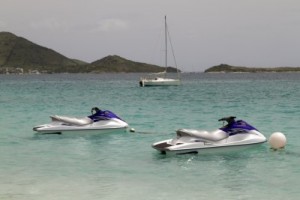 It is never a bad idea or waste of time to update and review boating and safety regulations for your PWC – personal watercraft. A personal watercraft is defined as a type of motorboat which is specifically designed to be operated by a person or persons sitting, standing, or kneeling on the vessel rather than inside the vessel and includes jet skis, wet bikes, etc. Any person being towed by a PWC is considered an occupant of the PWC, and is required to wear a life jacket.
It is never a bad idea or waste of time to update and review boating and safety regulations for your PWC – personal watercraft. A personal watercraft is defined as a type of motorboat which is specifically designed to be operated by a person or persons sitting, standing, or kneeling on the vessel rather than inside the vessel and includes jet skis, wet bikes, etc. Any person being towed by a PWC is considered an occupant of the PWC, and is required to wear a life jacket.
All equipment requirements for regular motorboats also apply to PWC. Each occupant must wear a United States Coast Guard approved life jackets. If the PWC is equipped with a cut-off or kill switch, it must be attached to the operator or operator’s clothing. Children under 13 are specifically prohibited from operating a PWC unless accompanied on board by a person at least 18 years of age who can lawfully operate the PWC.
All operational rules for regular motorboats also apply to PWC. In addition to those requirements, it is unlawful for any person to operate a PWC at a rate of speed greater than is reasonable or greater than will permit him/her to bring such a boat to a stop within the assured clear distance ahead. It is unlawful to cause a hazardous wake or wash. It is unlawful to jump the wake of another vessel in a reckless manner.
It is unlawful to operate in a circular course around any other boat or PWC occupied by a person engaged in fishing, waterskiing, or similar activity. It is unlawful to moor to any buoy, beacon, stake or flag. It is unlawful to anchor in the traveled portion of any body of water to prevents, impedes or interferes with safe passage of any other boat or vessel. It is also unlawful to operate your PWC in a designated fishing or swimming area.
It goes without saying that it is unlawful to operate while intoxicated (loss of mental or physical faculties, or blood alcohol content of .08 or higher). First conviction punishable by a fine not to exceed $2,000, confinement in jail not to exceed 180 days or both; second conviction punishable by a fine not to exceed $4,000, confinement not to exceed one year or both; third conviction punishable by a fine not to exceed $10,000, imprisonment for not more than 10 years or less than 2 years.
It is unlawful to swim or dive within two hundred yards of any sight-seeing or excursion boat except for maintenance purposes or unless within an enclosed area. Owners and operators of PWC must comply with the United States Coast Guard with regards to all rules of the road.
Texas Parks and Wildlife Department strongly recommends persons of all ages enroll in a Boater Education course. Excellent courses are available from many sources to help hone your boating skills, including online courses, Coast Guard Auxiliary courses.
Summer is around the corner. Soon the lakes and rivers will be bustling with activity. Stay apprised of all safety regulations and enjoy those days on your PWC.
Source: “Personal Watercraft Operation and Regulations. “TPWD:. Web. 13 Mar. 2013.
Follow Us: Facebook – Foursquare – Twitter – YouTube – LinkedIn
